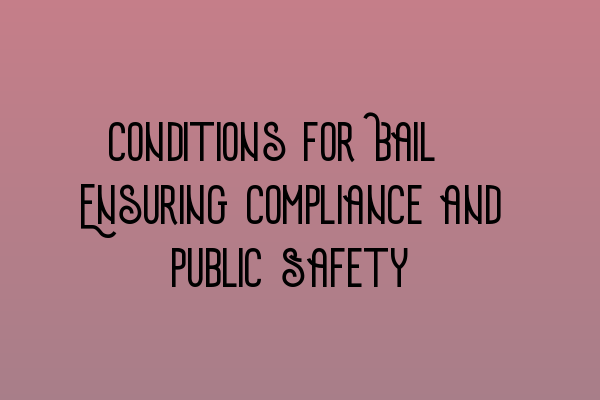<h1>Conditions for Bail: Ensuring Compliance and Public Safety</h1>
<p>Welcome to SQE Criminal Law & Practice Law UK, where we provide expert advice and guidance on various legal matters. In this blog post, we will explore the conditions for bail and how they ensure compliance and public safety. Bail is a crucial aspect of the criminal justice system, allowing individuals to be released from custody while their cases are pending. However, it is essential to impose certain conditions to ensure that defendants comply with their obligations and protect the public interest.</p>
<h2>Importance of Bail Conditions</h2>
<p>Bail conditions serve multiple purposes, including:</p>
<ul>
<li>Ensuring defendants appear at court hearings</li>
<li>Preventing re-offending or further criminal activity</li>
<li>Protecting victims and potential witnesses</li>
</ul>
<h2>Types of Bail Conditions</h2>
<p>Various types of bail conditions may be imposed, depending on the circumstances of the case and the defendant’s individual situation. Some common conditions include:</p>
<ul>
<li>Reporting to a designated police station at specified times</li>
<li>Surrendering travel documents/passports</li>
<li>Living at a specified address</li>
<li>Refraining from contacting certain individuals</li>
<li>Abstaining from alcohol or drugs</li>
<li>Wearing an electronic monitoring device</li>
</ul>
<h2>Risk Assessment</h2>
<p>When determining the appropriate bail conditions, the court conducts a risk assessment to evaluate the likelihood of non-compliance or potential harm to the public. Factors taken into consideration may include the nature of the offense, criminal history, ties to the community, and flight risk.</p>
<p>SQE Criminal Law & Practice Law UK offers comprehensive <a href=”https://fqps.co.uk/sqe/sqe1-preparation”>SQE 1 preparation courses</a> that cover the intricacies of bail conditions and various aspects of criminal law. Our courses are designed to equip aspiring solicitors with the knowledge and skills necessary to succeed in their legal careers.</p>
<h2>Monitoring Compliance</h2>
<p>It is essential to ensure that defendants adhere to their bail conditions throughout the duration of their cases. Failure to comply can result in bail being revoked and the defendant being remanded back into custody. Several measures are in place to monitor compliance, including:</p>
<ul>
<li>Regular check-ins with probation officers</li>
<li>Random drug tests</li>
<li>Surveillance and electronic monitoring</li>
</ul>
<h2>Public Safety Considerations</h2>
<p>Public safety is a paramount concern when determining bail conditions. The court aims to ensure that the release of a defendant does not pose a threat to the community. In cases involving violent offenses or those where there is a significant risk of re-offending, the court may impose stricter bail conditions, such as curfews or exclusion zones.</p>
<p>If you are preparing for the <a href=”https://fqps.co.uk/sqe/sqe2-preparation”>SQE 2 exams</a> and seeking additional resources, SQE Criminal Law & Practice Law UK also offers <a href=”https://fqps.co.uk/sqe/sqe1-preparation/practice-mocks-quiz”>SQE 1 practice mocks FLK1 FLK2</a> and <a href=”https://fqps.co.uk/sqe/sqe1-preparation/mcq-practice-quiz”>SQE 1 practice exam questions</a> to help you prepare effectively.</p>
<h2>Conclusion</h2>
<p>Bail conditions play a crucial role in the criminal justice system. They ensure defendants comply with their obligations and maintain public safety. The imposition of appropriate conditions helps prevent re-offending, protect victims and witnesses, and maintain the integrity of the legal process. At SQE Criminal Law & Practice Law UK, we are committed to providing comprehensive guidance on all aspects of criminal law, including bail conditions. Reach out to us for expert advice and assistance in your legal journey.</p>
